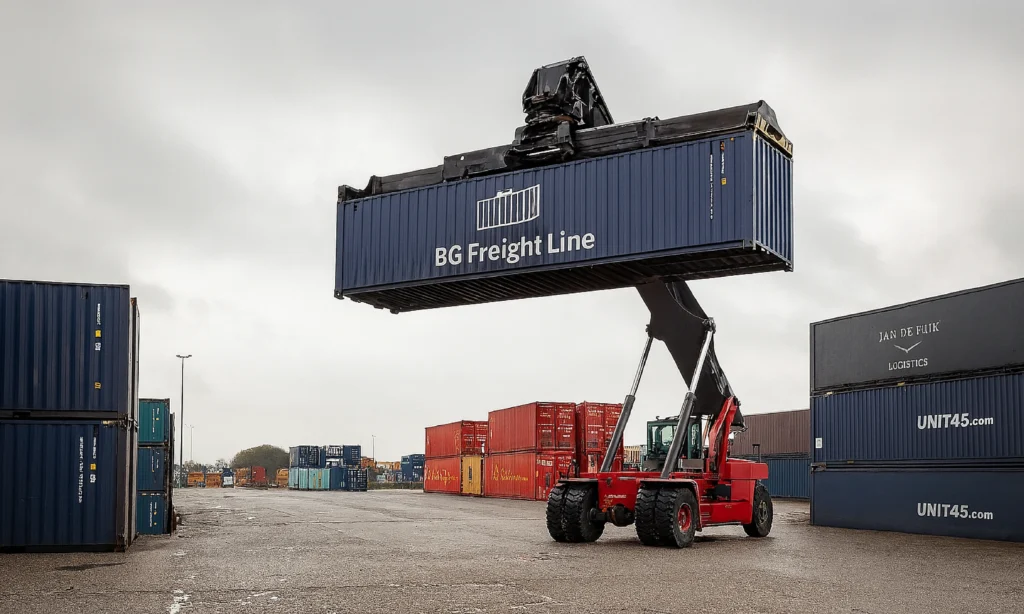The Greek ports have been the busy ports that linked Europe, Asia, and Africa. By 2025, these ports do not only play an essential role in trade; they are thriving hubs of employment, with candidates who want to join or expand their careers in the maritime logistics and cargo handling sector. We are going to reveal the secrets of cargo handling work in Greek ports and why it is still so attractive, what possibilities there are, and how you can prepare to become a happy person in this field.
The Importance of Cargo Handling in Greece’s Economy
Greek ports are major cargo handling points and thus contribute to the logistics and international trade in the country. As some of the busiest ports on the Mediterranean, the cargo operations in places such as Piraeus and Thessaloniki support thousands of positions, through stevedores, equipment operators, supervisors, planners and support personnel.
- Market Size: The size of the cargo handling industry in Greece is estimated at approximately 659.8 million euros in 2025 and there are more than 440 active companies in the country.
- Job Creation: The ports of Greece provide direct employment to thousands of people and the associated jobs are available in shipping agencies, freight forwarding, warehousing and logistics firms.
- Growth Outlook: The industry is set to grow after some years of changes, which are facilitated by the fact that more investments are being made in the port infrastructure and the strategic positioning of Greece in the major shipping routes.
The Reasons why Greek Ports are increasing Cargo Handling Works
Greek ports are appealing to both home and international jobseekers owing to a number of reasons:
- Strategic Trade Hub: The ports of Greece are key nodes in the international supply chain, which makes the country a hub of distribution of goods in Europe, the Balkans, and other regions.
- Modernization and Investment: The terminals are state-of-the-art and technology upgrades, particularly in Piraeus and Thessaloniki have increased capacity and productivity and the range of functions to be performed.
- Increasing Talent Shortages: As trade and technology change, there is a constant need of skilled and entry-level cargo handlers, which provides a chance to grow fast.
- International Employers: Multinational shipping companies and local firms create new vacancies on a regular basis, including manual jobs, supervisor, and logistic planner.
Key Cargo Handling Roles at Greek Ports
Greek ports have a very large range of job profiles under cargo handling. Popular are;
- Stevedores (Dockworkers): The stevedores are the ones who load and unload the goods of the ship, secure loads, and use the machinery at the port.
- Terminal Operators: Supervise the transfer of cargo, coordinate logistical services and facilitate a vessel turnaround.
- Port Operations Representatives: Arrange the shipping schedule, crew picking and dropping, and managing the communication with various sponsors to ascertain the observance within the rules.
- Equipment Operators: This is a position that handles the operation of cranes, forklifts, and other equipment that is essential in sound and speedy transport of cargo.
- Warehouse and Storage Staff: Assist with the consolidation, sorting and documentation of goods in or out of the port area.
Required Skills and Qualifications
Although there is no need to be highly qualified to work in the cargo handling sector at the entry-level, the possession of related competencies enhances the chances of getting a job and better pay:
Core Requirements
- Physical Fitness: Cargo work is strenuous work and may involve strength, stamina and working in the open in different weather conditions.
- Safety Awareness: It is important to know the standards of safety in the workplace.
- Teamwork: The efficiency of operations is based on the close collaboration with the supervisors, the machinery operators, and logistics planners.
- Technical Skill: The familiarity with port technology and the equipment that deal with is admired, as automation will be increasing in the Greek ports.
- Local Language Skills: The candidate will also be expected to be fluent in Greek or English depending on the type of position applied.
Preferred Qualifications
- Relevant qualifications: Degrees or diplomas in shipping, business or logistics.
- Education: Literate on various technical subject, Forklift, crane operation or safety training certification.
- Experience: Previous experience of working in logistics, warehouse, or port will give an advantage.
Salary Trends & Working Conditions
- Salary Range: Dockworkers are paid between 42 and 50 euros a day as entry level workers with increase in experience. Supervisory and specialized positions can be paid better, which is also in line with the national averages of wages in transportation and logistics.
- Advantages: Most of the jobs are based on permanent contracts, continuous training, and career development- port work is a viable career option.
- Work Schedule: The nature of cargo movements is continuous and as such, port jobs tend to be on shift basis (including nights and weekends).
How to Apply for Cargo Handling Jobs
Where to Find Openings
- Port Authority Websites: Watch the official websites of the major ports like Piraeus and Thessaloniki to see first hand postings.
- Big Shipping Companies: Look at the career pages of big operators and logistics companies operating in Greece.
- Specialist Recruitment Agencies: The agencies specializing in the maritime staffing often post the vacancies which are urgent and seasonal and those are offered to the foreign applicants.
- Job Boards: National as well as international task web sites (connecting such as LinkedIn, LinkedIn, Indeed) usually list cargo handling work for ports in Greece.
Application Essentials
- Customized CV: Mention any logistic or warehouse experience or previous experience in the manual labor.
- Use of language: an accent and focus on abilities like Greek language and English language.
- Certificates: Duplicates of any Equipment handling, safety and any form of technical certification.
- References: You should present professional references to increase your chances of success.
Opportunities for Foreign Workers
- Growing Demand: Greece is expected to host thousands of foreign workers to cover the shortages in the field of logistics, construction, and port activities. The bilateral contracts like the one with India have facilitated the acquisition of positions by non-EU candidates.
- Seasonal Assignment: A large proportion of jobs, as well as cargo and allied in logistics are seasonal, over peak months of trade or cruise seasons.
- Integration Food: Employers and state programs provide foreign laborers with support to integration process, training and language course-enhancing employment and professional networking, rate of disappearance and ability to grow.
Future Prospects: Why Consider a Career in Greek Port Cargo Handling?
- Industry Growth: The cargo handling industry in Greece will continue to grow in the future due to increase in trade volumes as well as investments in infrastructure.
- Innovation: Automation and digitalization is restructuring port labor and producing more highly skilled jobs and a need for certified labor.
- Mobility: The skills learned in Greek ports can be applied to any maritime work in any country around the world- a solid career advancement base.
- Competitive Wages: The logistics labor cost index increased by 15.8 percent year-on-year at the end of 2024, and the situation is getting better in the transportation and storage sector of Greece.
Tips for Job Seekers
- Invest in Training: Find training or certification in any fields which might be useful in the running of the port and port safety.
- Network Locally: Go to the industry job fairs, career days at the ports, or make contact with industry associations in the field of maritime logistics.
- Be Informed: Check port authority and other major logistics companies websites on a regular basis to see new posts.
- Be Open-Minded: The ability to work in various shifts as well as engage different tasks will be appreciated, particularly during entry-level jobs.
Conclusion
Working in the cargo handling sector in Greek ports in 2025 presents a gateway to secure, energetic, and fulfilling career in one of the crucial areas of the Greek economy. Due to the high rate of modernization, employment opportunities and good prospects both locally and internationally, it is the right moment to start or develop your career in this fundamental sector. Seize the chance and develop your skills and you will be prepared to serve the increasing demand at the busy maritime ports of Greece.



